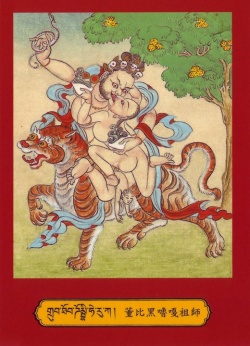Dombhipa
- See also :
- See also :
ཌོམྦི་པ།; Ḍombipa; Dombipa; The Tiger-Rider;
Mahasiddha Dombhipa… Dombipa / Dombipāda (dom bhi he ru ka): “He of the Washer Folk”/”The Tiger Rider”
Dombipa, the king of Magadha, was initiated by the guru Virupa into the meditation rites of the Buddha-deity Hevajra. This practice gave him much magical power, yet he kept them hidden. Magadha through him, what was once a place ravaged by war, poverty, famine, and crime turned into a prosperous kingdom. Many years later, a troupe of low-caste wandering minstrels performed for the king. Through out the entertainment, the king could not take his eyes off a young girl, the 12 year old performer who was untainted by the world. She had all the qualities of a lotus child, a padmini, and the king decided then and there to make her his spiritual consort. Although a union with a low-caste was not allowed, the king paid no attention to that and paid for the girl, her weight in gold. For many years, their mystic union was hidden, but in the 12th year their secret was discovered, and the king and his consort were forced to leave, disappearing into the jungle where they devoted themselves to the practice of tantric yoga.
When Dombipa left, the kingdom of Magadha began to decline. In despair, the new king (Dombipa’s son) ordered a council and accumulatively they decided the old king should be asked to return, and a search team was dispatched to find him. They looked high and low for Dombipa for weeks, and finally one day when they were about to return home in failure, they saw Dombipa and his consort in a tranquil environment in the forest. Afraid to intrude upon the royal solitude, they rushed back to report what they witnessed, and another team was sent, this time more properly equipped with messages, pleas, and prayers to invite the king to return. When the king received their message, he agreed to return in 2 weeks. On the day of his return, thousands of people lined the route to greet him, and the king, brandishing a deadly snake as a whip, emerged from the jungle riding with his consort on the back of a pregnant tigress. Frightened, the people fell their knees and begged him to govern their country once again.
However, the king replied, “How can I possibly do as you ask? You drove me away because I had lost my caste status by consorting with a woman of low birth. Casteless, I cannot rule.” The people began to wail, but the king took pity on them and ordered them build a funeral pyre, where he and his consort shall be burnt and their rebirth will be absolved. For seven days it perfumed the air and for seven nights it lit the sky as brightly as the sun. The fire mysteriously disappeared on the 8th day, and hovering in the air was a lotus-shaped cloud where the king, in the guise of the Buddha-deity Hevajra in ecstatic union with his consort sat.
The king then said to all, “if you can find it in your hearts to do as I have done, I will stay to govern you.” However, he was met with protests. Disappointed, the king sighed deeply and his form began to be increasingly transparent. His last words were, “My only kingdom is the kingdom of truth.” Whereupon he dissolved into perfect awareness and pure delight, to dwell forever in the Paradise of the Dakinis.
